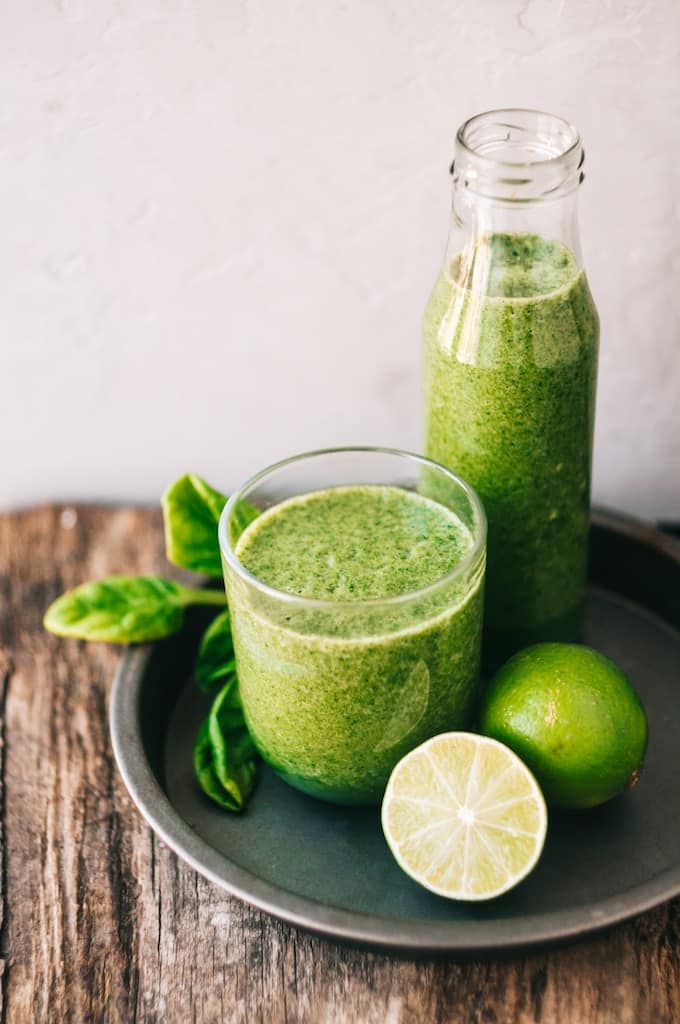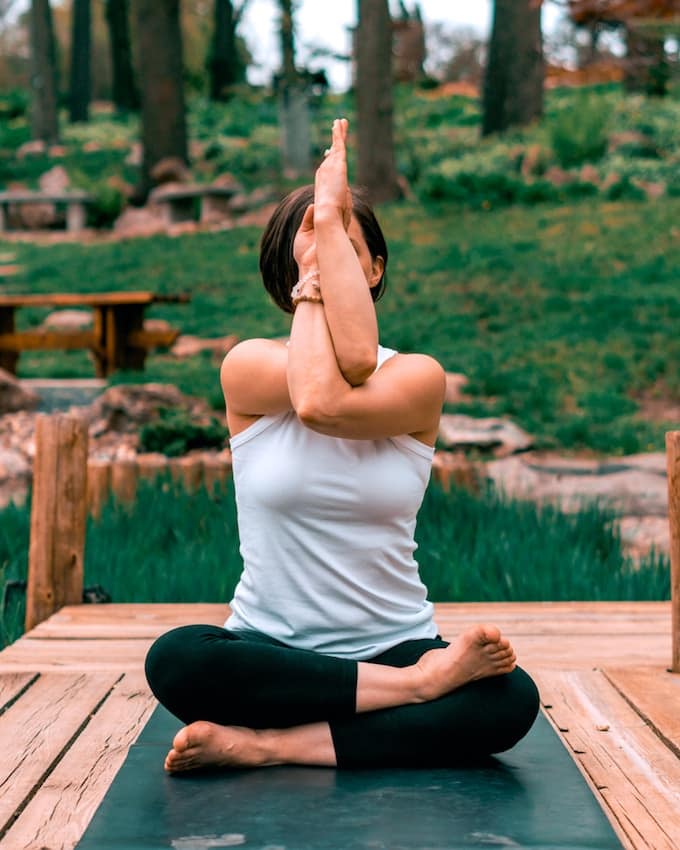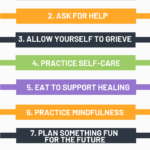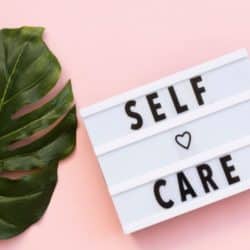Tips to Deal with a Cancer Diagnosis (Plus My Experience)
Almost 2 million people in the United States are diagnosed with cancer every year. If you or someone you know is dealing with a cancer diagnosis, here are 10 tips for how to cope based on my own personal experience.

Getting the Diagnosis
The call from my doctor was one that I’ll never forget. I had recently undergone a biopsy of my thyroid gland after an ultrasound revealed a suspicious spot. My doctor assured me before the biopsy that it was likely benign, but it was important to check it out further.
When he called only 3 days after the biopsy, I had an immediate ominous feeling that he was going to tell me what I didn’t want to hear.
“Carrie, this is Dr. Bennett calling.” My heart sank at the sound of his voice.
“Yes, hi Dr. Bennett,” I responded shakily.
“We got the results from your biopsy,” he said. “They found cancer cells. You’ll need to have surgery sometime in the next 6 weeks to remove the cancer.”
I nearly collapsed in distress after hearing what he said. It was the call that nobody ever wants and forever changes the course of one’s life. I was utterly devastated to receive a cancer diagnosis at the age of 37, and it took courage and strength that I didn’t know I had to recover both physically and emotionally.
Statistics
According to the National Cancer Institute of the United States, there were nearly 1.8 million new cases of cancer diagnosed in 2018. And, almost 40% of people will be diagnosed with cancer at some point in their lives. Worldwide, in 2012, there were 14.1 million new diagnosed cases of cancer.
The most common types of cancer that are diagnosed in the US include:
- breast cancer
- lung cancer
- prostate cancer
- colon cancer
- skin cancer
- bladder cancer
- non-Hodgkin lymphoma
- kidney and renal pelvis cancer
- endometrial cancer
- leukemia
- pancreatic cancer
- thyroid cancer
- and liver cancer
I made a lot of mistakes after my diagnosis, including not accepting help from others and not giving myself enough time to recover from surgery.
I suffered the consequences by feeling isolated, afraid, and unwell. It wasn’t until several years after my cancer surgery that I started to feel back to my “old” self, although life certainly was never the same as before cancer.
The good news is that a cancer diagnosis doesn’t have to be as hard for other people as I made it for myself. There are a lot more resources available even in just the almost 8 years since I went though the experience. I compiled these tips to help you or someone you love who might be dealing with some of the same things I dealt with.
I’ll never say that I appreciate cancer because it made me a stronger or better person, but it was an experience that made me take a hard look at how I treat myself, and realize that I had to slow down and take care of myself as well as I take care of others I love.
1. Find social support
It might seem obvious, but having the support of others is actually a proven strategy to have a better outcome. Support can come from family members, friends, nurses, healthcare providers, or other patients.
The important part is that you feel that you have people to talk to and you don’t feel isolated or alone.

2. Ask for help
Even small tasks like cooking dinner every night can become overwhelming after you’ve had a cancer diagnosis. Practice asking for help with little things, like asking a neighbor to take your trash cans out for you.
People most likely would love to lend a helping hand when you could use some extra help.

3. Allow yourself to grieve
A cancer diagnosis is life-altering. It brings up all kinds of feelings and regrets and fears. If you have to have surgery like I did, then it’s normal and healthy to grieve for losing a part of your body, even if it is cancerous. For me, I had to grieve for the loss of my thyroid gland.
For other cancer patients, it might be necessary to work through other emotions surrounding the diagnosis, including anger, sadness, regret, fear, and more. A qualified mental health practitioner can help you work through these emotions and learn to develop healthy coping skills.

4. Practice self-care
This is a popular trend right now, but it can be a difficult habit to take into practice. Self-care habits can be anything from taking a bath to buying yourself fresh flowers to reading a book to getting a massage. The important part is that it feels loving toward yourself. You need all the love you can get right now, and who better to love than yourself?
See some of my other holistic health tips that might help you learn to take better care of yourself.

5. Choose foods and supplements to support your healing
Your doctor or cancer care center will likely have a recommended diet and supplement routine for you to follow, and most likely that includes a variety of nourishing real, whole foods. A clean eating diet doesn’t have to be restrictive, but it emphasizes more natural foods and fewer processed foods.
See my tips on how to eat clean.
Check out my Anti-Cancer Green Breakfast Smoothie recipe (not intended to replace of cancer treatment) or see all of my healthy smoothie recipes.
Supplements that support the immune system can be helpful before or after your treatment. Be sure to speak to your doctor for the best recommendations.

6. Practice mindfulness and gratitude
A cancer diagnosis can lead to an increase in anxiety and even panic. Sitting quietly or journaling for 10–15 minutes several times a day can help you focus on your present situation and keep fears about the future at bay.
Fostering a sense of gratitude can also help you through this difficult time. Of course, it’s not always easy to find gratitude in the face of extreme fear or pain, but your gratitude can be for the simplest things, such as the warmth of a hug from a friend, the smell of the fresh air on a sunny day, or the color of the sky.
If you are experiencing panic attacks or severe anxiety, it is best to reach out to a therapist to help you cope. See all my articles about supporting mental and emotional health.

7. Plan something fun for the future
After my cancer diagnosis and as I was preparing for surgery, I set the goal of going to Europe. I didn’t know how or when that would happen, but it gave me something to look forward to.
Three years after my surgery, I went on an unforgettable river boat tour with my husband through the Netherlands, Germany, Austria, and Hungary. Since then, we try to do at least one special trip a year.

8. Stay active, but don’t overdo it
Gentle activity like gentle yoga, tai chi, or walking outside can do a lot for both your mental and physical health after a cancer diagnosis.
While it can be difficult to stay active while you’re undergoing treatment or recovering surgery, even just gentle walking for 20 minutes a day is often allowed and can do wonders for your circulation and mental well-being.

9. Practice breathing exercises
Simple breath work that includes counting to 4 (both breathing in and out) can be a helpful practice to calm the nervous system.
Try to practice every day so that it feels natural and you get used to using your breathing to find calmness. Be especially aware of your breath as you undergo any stressful procedures during your treatment.
10. Don’t give up hope
There are incredible strides being made in cancer treatment. Do your research and make sure you feel confident and comfortable with your doctors and treatments.
It’s not as easy road, but there is so much hope for recovery.
My Journey
I was fortunate that my cancerous tumor was found relatively early. Even though the experience was hugely traumatic and disruptive and frightening, after 10 years of living as a cancer survivor, I have found healing and hope for my life after cancer.
I’m hugely grateful to be past what was the hardest obstacle I’ve ever had to face, and even more committed to a healthy lifestyle than ever. It’s not about living in fear or regret, but moving forward with intention, gratitude, and reverence for each amazing day we get to be alive.
Conclusion
The statistics around cancer diagnosis and mortality are alarming, with an estimate that almost 40% of people will be diagnosed with cancer at some point in their lives. This article includes tips for how to manage a cancer diagnosis of yourself or a loved one.
More Helpful Health Resources
Don’t forget to join my newsletter list to get exclusive clean eating recipes and tips. The newsletter is 100% free with no spam; unsubscribe anytime.
About the Author: Carrie Forrest has a master’s degree in public health with a specialty in nutrition. She is a top wellness and food blogger with nearly 10 million annual visitors to her site. Carrie has an incredible story of recovery from chronic illness and is passionate about helping other women transform their health. Send Carrie a message through her contact form.
Note: this post is for informational purposes only and is not intended as medical advice. Please consult your healthcare provider for recommendations related to your individual situation.





















Hello,
Thank you very much for valuable information.
Dr. Greger recommends to chop broccoli at least 40 minutes before eating to produce max amount of sulforaphane. Any suggestions on how to incorporate his advice into green smoothie?
Thank you,
Bob.
I have a few smoothie recipes using broccoli and broccoli sprouts you might like. Just search “broccoli” on this site and you’ll see the recipes. 🙂
I had thyroid cancer twice that had spread throughout lymph nodes in my neck. I had my thyroid gland removed, radioactive iodine, and then a neck dissection the second time around.
Everyone, of course, goes through their own journey. I generally hate story comparisons, because someone can always have it worse. Had a leg amputated? That guy had both legs amputated. That woman has no arms or legs, so be grateful you have your arms. Things of that nature.
They said, I truly feel it’s insulting to people who have had types of cancer that require chemo and radiation treatment to say that I’m a cancer survivor. They go through absolute hell with absolutely horrible side effects and worrying about death. Only a very small percentage of thyroid cancers are fatal, so I didn’t even have to worry about that, especially when I found out it was papillary.
I had to have two surgeries, follow an iodine- free diet for two weeks, have a radioactive iodine treatment, and be in isolation for a week. That is nothing, simply nothing, compared to what others have to go through. I didn’t survive much more than inconveniences.
Even though it was cancer, it was more like having some other disease because the hallmarks of cancer treatment and worrying about dying just weren’t there. So, yes, it was a condition that caused a few bumps in the road, things I still deal with, but it wasn’t a devastating diagnosis.